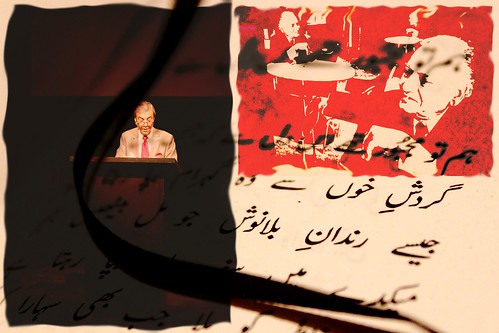Urdu in its true form is a language known for its immense beauty, combining Persian, Turkic, and Arabic influences with the "Khariboli" dialect of early Delhi in Hindustan. When spoken the way it was as it emerged out of the Delhi Sultanate, through the Mughal Empire, and into its new home in 20th century Pakistan, it emanates such a regal sense of appreciation for the human voice, and its ability to express the purity of emotions and life through words is fascinating. Urdu poets like legendary Faiz Ahmed Faiz have helped Urdu flourish as a language of poetry and song, both in Pakistan as well as in India, and celebrating, retaining, and passing on this exquisite language in its essence is of such importance: languages, I feel, hold the keys to all the histories of our people and their lives and cultures on this earth.
When a Tribute to Faiz Ahmed Faiz comes along, then, I cannot miss it, especially when the poetry is to be recited by immensely famous Pakistani actor Zia Mohiuddin, who trained at the Royal Academy of Dramatic Arts in London, and is particularly famous for his voice. He has appeared in both western and eastern theater and film, such as "Lawrence of Arabia" in 1963 and BBC's version of "A Passage to India." In researching more about him this evening, I learned that he married famous Pakistani kathak dancer Naheed Siddiqui in the early '70s.
Interestingly, both Mohiuddin and Faiz Ahmed Faiz (b. 1911 d.1984) ran into trouble with Pakistan's governments at different times, the former for his patronage of the arts under Gen. Zia-ul-Haq, 6th President of Pakistan known by most Pakistanis that I've spoken to as "the man who ruined everything" (Zia-ul-Haq imposed martial law and brought in the extreme Islamization of the state, himself a fundamentalist. I often hear my parents and their friends speak of how wonderful Pakistan was before Zia-ul-Haq, especially under Ayub Khan; "Ahh, Ayub Khan ka zamana kuch aur hi tha! That was the Golden Age of Pakistan!").*
Faiz Ahmed Faiz, on the other hand, ran into trouble with an earlier government of Pakistan for being a communist at a certain point in his life, and went to jail for it. Many of the pieces Zia Mohiuddin recited this afternoon were those written by Faiz sahib during his time in jail. He writes in one poem of a little bird he and the other prisoners notice that comes and sits at the window. They try to keep the bird as a pet in a little basket, but the bird gets loose, string still tied to one of its feet. Somehow the bird escapes but its leg is broken, and it cries during the night, and Faiz and the others cry to hear its pain without being able to help it.
So many of his poems are filled with this kind of natural simplicity of the human experience, but he uses the beauty of the Urdu language to describe that experience in a way that touches your heart and brings the desi exclamation of immense approval and enjoyment, "Wah! Wah!" to your lips. He is known for his sense of humor, also expressed through many of his works, and so is a beloved poet of Pakistan. I've posted the videos I took of Zia Moiuddin's introduction to the recital and his recitation of a few of Faiz Ahmed Faiz's poems on YouTube - see them below or visit the Playlist on YouTube.
It was quite heartening for me to see today's event in Los Angeles (held by Pakistan Arts Council of Pacific Asia Museum and The Citizens Foundation) and the great turn-out. There is yet an appreciation and love for the language of Urdu in its classical form that continues into the 21st century lives of Pakistanis in the diaspora. I must comment, though, that from as far as I could see, I was one of the very, very few people of the younger generation attending the event. What can be done to bring back knowledge of, skills in, and appreciation for Urdu as a language amongst the youth? What made so many of us lose it in the first place?
Regardless, I am proud of our community here for organizing the event and celebrating so much of our fabulous culture all at once: Zia Mohiuddin, Faiz Ahmed Faiz, and Urdu poetry.
*[BTW, if you're an avid reader of fiction and/or are interested in learning more about a little chunk of time in Pakistan's political history, I highly recommend one of my favorite books of all time, Shame by Salman Rushdie]
Tweet

No comments:
Post a Comment